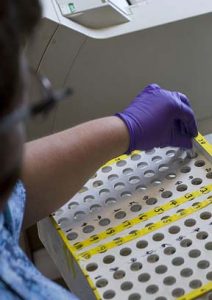
Your Dog And Cat’s Alkaline Phosphatase Level
aka AP, Alk Phos, ALP, SAP, ALP
Ron Hines DVM PhD
Health Problems That Can Cause Too Much Alkaline Phosphatase To Be Present In Your Cat Or Dog’s Blood:
A mildly elevated level of AP is found in normal dogs and cats when they are immature. But when AP enzyme is elevated in the blood of mature pets, most cases are associated with a primary or secondary liver problem that prevents the normal flow of bile. In mature pets, AP is considered a biomarker of liver dysfunction.
In cats, the two most common causes of an elevated alkaline phosphatase level are cholangiohepatitis and hepatic lipidosis (HL). In HL, blood bilirubin levels are usually quite elevated as well. Bile duct obstruction such as due to gallstones can be the cause as well. Particularly, when GGT enzyme is elevated equally or greater.
Some specialists believe that about 80% of dogs that have a 3-4 fold increase in their AP levels suffer from Cushing’s disease. Topical, ear and eye medications and oral and injectable products containing corticosteroids to reduce inflammation have also been blamed for higher than normal AP levels. It is unclear if that is due to leakage from liver cells or stimulation of bone turnover. (read here) Less is known about corticosteroid’s effects on AP level in cats. However, simple stress, apprehension, and fear causes a sudden increase in corticosteroid (cortisol) level in cats and stress is also known to elevate AP levels in cats.
Other possible causes are FIP in cats, hyperthyroidism in cats and hypothyroidism in dogs. Less common causes are diabetes in dogs, in cats, kidney failure-related hyperparathyroidism, liver and bone cancers, liver-toxic dietary toxins (such as aflatoxins), liver granulomas, abscesses, pancreatitis in dogs or in cats, upper intestinal inflammation, anti-seizure medications, autoimmune diseases and gallbladder inflammation. Occasionally mammary gland tumors, healing fractures or liver reactions to anti-arthritic and anti-inflammatory NSAID medications such as carprofen (Rimadyl®) or meloxicam. (Metacam®). Mild persistent elevations are more of a worry in cats than in dogs.
Alkaline phosphatase levels sometimes go up in dogs with failing hearts and in genetically based, copper storage diseases of Dobermans, West Highland White and Bedlington terriers. AP can also be high in pregnant cats – perhaps because the fetuses’ bones are developing. Hyperthyroidism, as I mentioned before, can also be responsible for moderately increased AP levels in your cat. Dogs almost never develop overactive thyroid glands (hyperthyroidism). In older dogs, sluggish thyroid glands, rather than overactive thyroid glands, are the rule (hypothyroidism).
Elevated sex steroid levels due to adrenal gland dysfunction has also been associated with a higher than normal AP level.
In general, both AP and ALT should be elevated when liver disease is your pet’s underlying health issue.
An elevated AP test is also a common finding in Scottish terriers. Although other breeds with consistently high AP levels should be tested for Cushing’s disease, Cushing’s disease (hyperadrenocorticism) has not been associated with Scotties that have elevated AP.
I am more concerned when a number of liver-related tests are a bit high than when only one is. Of course, if your pet is feeling poorly, has lost weight or its AP result was quite high, waiting to learn why is not a good idea. Physicians face the same dilemma. (ask me for AlkalinePhosGiannini2007)
Health Problems That Can Cause Too Little Alkaline Phosphatase To Be Present In Your Pet’s Blood:
I know of none. Have the test repeated at a central veterinary diagnostic laboratory to confirm results obtained at your local animal hospital. (read here) If not, and your pet appears fine, ask that the test be repeated in 2–3 weeks. Many times the AP test result has improved.
Complementary Tests:
An abdominal ultrasound examination, liver-specific AP isoenzyme level determination, ALT, AST, GGT/GLDH, bile acids, Urine cortisol:creatinine ratio, bilirubin (often goes up later in liver disease) ACTH stimulation test or Low Dose Dexamethasone Suppression Test when Cushing’s disease is suspected. Leptospirosis PCR test and toxoplasmosis antibody titer. occult heartworm antigen test.
Drugs associated with liver damage and elevated AP levels include:
Acetaminophen (Tylenol™), asparginase for lymphoma, azathioprine for autoimmune disease, carprofen (Rimadyl®) for arthritis, corticosteroids, griseofulvin for ringworm infections, halothane anesthetic, methoyflurane anesthetic, ketoconazole antifungal medication, mebendazole, or metronidazole (Flagyl®), methotrexate anti-tumor medication, phenobarbital or primidone given for seizures, sulfonamide antibiotics and tetracycline. There are many more.
DxMe